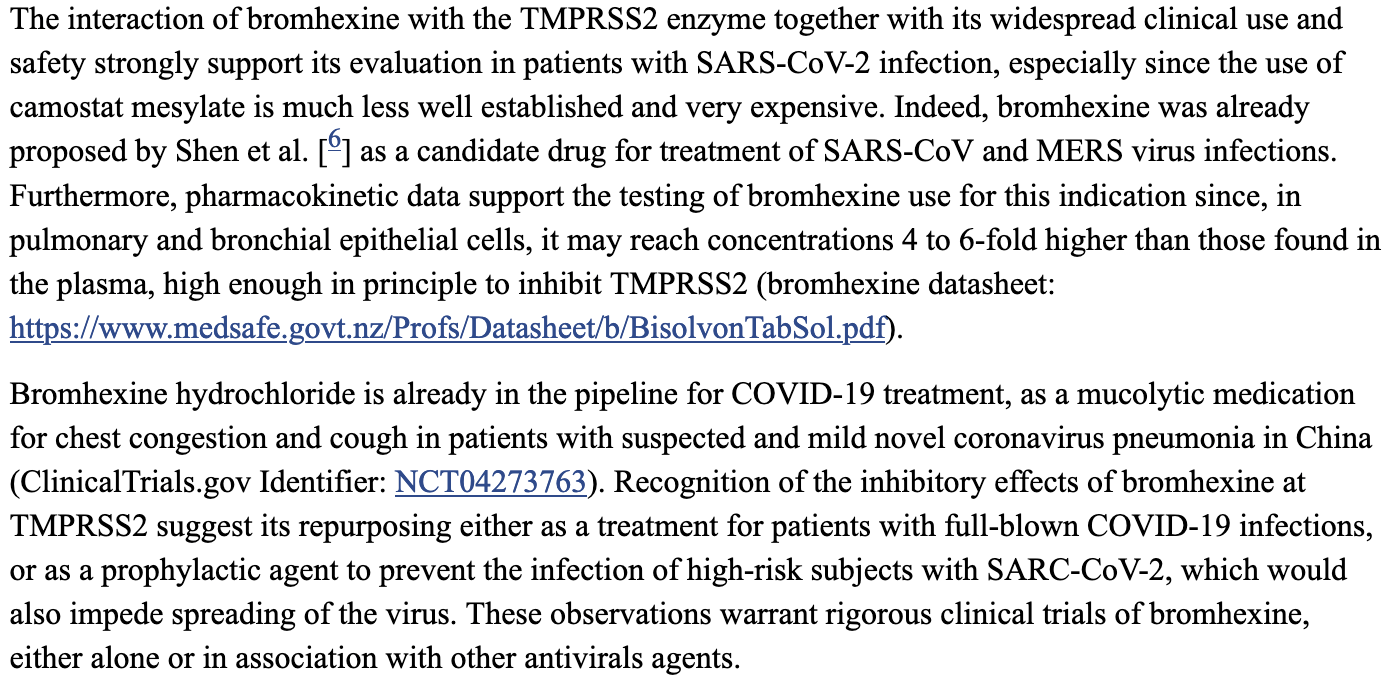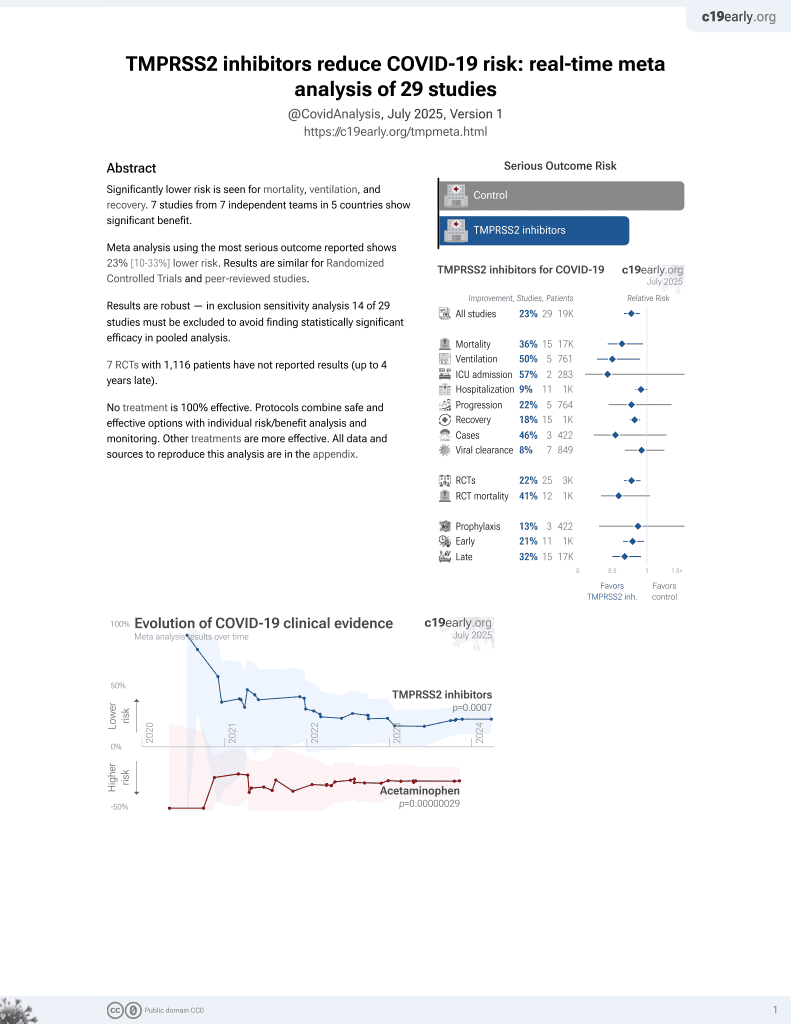
Repurposing the mucolytic cough suppressant and TMPRSS2 protease inhibitor bromhexine for the prevention and management of SARS-CoV-2 infection
et al., Pharmacol Res., doi:10.1016/j.phrs.2020.104837, Apr 2020
22nd treatment shown to reduce risk in
April 2021, now with p = 0.00063 from 29 studies.
No treatment is 100% effective. Protocols
combine treatments.
6,400+ studies for
210+ treatments. c19early.org
|
Proposal to use bromhexine for prophylaxis and treatment of COVID-19 based on TMPRSS2 inhibition, widespread clinical use, and supporting pharmacokinetic and safety data.
Review covers TMPRSS2 inhibitors and bromhexine.
1.
Saha et al., Inhaled Dry Powder of Antiviral Agents: A Promising Approach to Treating Respiratory Viral Pathogens, Viruses, doi:10.3390/v17020252.
2.
Baby et al., Exploring TMPRSS2 Drug Target to Combat Influenza and Coronavirus Infection, Scientifica, doi:10.1155/sci5/3687892.
3.
Mitev, V., Comparison of treatment of COVID-19 with inhaled bromhexine, higher doses of colchicine and hymecromone with WHO-recommended paxlovid, molnupiravir, remdesivir, anti-IL-6 receptor antibodies and baricitinib, Pharmacia, doi:10.3897/pharmacia.70.e112550.
Maggio et al., 22 Apr 2020, peer-reviewed, 2 authors.
Repurposing the mucolytic cough suppressant and TMPRSS2 protease inhibitor bromhexine for the prevention and management of SARS-CoV-2 infection
Pharmacological Research, doi:10.1016/j.phrs.2020.104837
Since January 2020 Elsevier has created a COVID-19 resource centre with free information in English and Mandarin on the novel coronavirus COVID-19. The COVID-19 resource centre is hosted on Elsevier Connect, the company's public news and information website. Elsevier hereby grants permission to make all its COVID-19-related research that is available on the COVID-19 resource centre -including this research content -immediately available in PubMed Central and other publicly funded repositories, such as the WHO COVID database with rights for unrestricted research re-use and analyses in any form or by any means with acknowledgement of the original source. These permissions are granted for free by Elsevier for as long as the COVID-19 resource centre remains active.
References
Böttcher, Matrosovich, Beyerle, Klenk, Garten et al., Proteolytic activation of influenza viruses by serine proteases TMPRSS2 and HAT from human airway epithelium, J. Virol
Hoffmann, Kleine-Weber, Schroeder, Hoffmann, Kleine-Weber, None, Pharmacological Research
Iwata-Yoshikawa, Okamura, Shimizu, Hasegawa, Takeda et al., TMPRSS2 contributes to virus spread and immunopathology in the airways of murine models after coronavirus infection, J. Virol
Kawase, Shirato, Van Der Hoek, Taguchi, Matsuyama, Simultaneous treatment of human bronchial epithelial cells with serine and cysteine protease inhibitors prevents severe acute respiratory syndrome coronavirus entry, J. Virol
Lucas, Heinlein, Kim, Hernandez, Malik et al., The androgen-regulated protease TMPRSS2 activates a proteolytic cascade involving components of the tumor microenvironment and promotes prostate cancer metastasis, Cancer Discov
Schroeder, Krüger, Herrler, Erichsen, Schiergens et al., SARS-CoV-2 cell entry depends on ACE2 and TMPRSS2 and is blocked by a clinically proven protease inhibitor, Cell
Shen, Mao, Wu, Tanaka, Zhang, TMPRSS2: a potential target for treatment of influenza virus and coronavirus infections, Biochimie
DOI record:
{
"DOI": "10.1016/j.phrs.2020.104837",
"ISSN": [
"1043-6618"
],
"URL": "http://dx.doi.org/10.1016/j.phrs.2020.104837",
"alternative-id": [
"S1043661820311452"
],
"article-number": "104837",
"assertion": [
{
"label": "This article is maintained by",
"name": "publisher",
"value": "Elsevier"
},
{
"label": "Article Title",
"name": "articletitle",
"value": "Repurposing the mucolytic cough suppressant and TMPRSS2 protease inhibitor bromhexine for the prevention and management of SARS-CoV-2 infection"
},
{
"label": "Journal Title",
"name": "journaltitle",
"value": "Pharmacological Research"
},
{
"label": "CrossRef DOI link to publisher maintained version",
"name": "articlelink",
"value": "https://doi.org/10.1016/j.phrs.2020.104837"
},
{
"label": "Content Type",
"name": "content_type",
"value": "simple-article"
},
{
"label": "Copyright",
"name": "copyright",
"value": "© 2020 Elsevier Ltd. All rights reserved."
}
],
"author": [
{
"affiliation": [],
"family": "Maggio",
"given": "Roberto",
"sequence": "first"
},
{
"affiliation": [],
"family": "Corsini",
"given": "Giovanni U.",
"sequence": "additional"
}
],
"container-title": "Pharmacological Research",
"container-title-short": "Pharmacological Research",
"content-domain": {
"crossmark-restriction": true,
"domain": [
"elsevier.com",
"sciencedirect.com"
]
},
"created": {
"date-parts": [
[
2020,
4,
22
]
],
"date-time": "2020-04-22T15:54:19Z",
"timestamp": 1587570859000
},
"deposited": {
"date-parts": [
[
2020,
12,
4
]
],
"date-time": "2020-12-04T23:55:36Z",
"timestamp": 1607126136000
},
"indexed": {
"date-parts": [
[
2024,
5,
1
]
],
"date-time": "2024-05-01T22:10:04Z",
"timestamp": 1714601404532
},
"is-referenced-by-count": 57,
"issued": {
"date-parts": [
[
2020,
7
]
]
},
"language": "en",
"license": [
{
"URL": "https://www.elsevier.com/tdm/userlicense/1.0/",
"content-version": "tdm",
"delay-in-days": 0,
"start": {
"date-parts": [
[
2020,
7,
1
]
],
"date-time": "2020-07-01T00:00:00Z",
"timestamp": 1593561600000
}
}
],
"link": [
{
"URL": "https://api.elsevier.com/content/article/PII:S1043661820311452?httpAccept=text/xml",
"content-type": "text/xml",
"content-version": "vor",
"intended-application": "text-mining"
},
{
"URL": "https://api.elsevier.com/content/article/PII:S1043661820311452?httpAccept=text/plain",
"content-type": "text/plain",
"content-version": "vor",
"intended-application": "text-mining"
}
],
"member": "78",
"original-title": [],
"page": "104837",
"prefix": "10.1016",
"published": {
"date-parts": [
[
2020,
7
]
]
},
"published-print": {
"date-parts": [
[
2020,
7
]
]
},
"publisher": "Elsevier BV",
"reference": [
{
"DOI": "10.1158/2159-8290.CD-13-1010",
"article-title": "The androgen-regulated protease TMPRSS2 activates a proteolytic cascade involving components of the tumor microenvironment and promotes prostate cancer metastasis",
"author": "Lucas",
"doi-asserted-by": "crossref",
"first-page": "1310",
"journal-title": "Cancer Discov.",
"key": "10.1016/j.phrs.2020.104837_bib0005",
"volume": "4",
"year": "2014"
},
{
"DOI": "10.1128/JVI.01118-06",
"article-title": "Proteolytic activation of influenza viruses by serine proteases TMPRSS2 and HAT from human airway epithelium",
"author": "Böttcher",
"doi-asserted-by": "crossref",
"first-page": "9896",
"journal-title": "J. Virol.",
"key": "10.1016/j.phrs.2020.104837_bib0010",
"volume": "80",
"year": "2006"
},
{
"DOI": "10.1128/JVI.01815-18",
"article-title": "TMPRSS2 contributes to virus spread and immunopathology in the airways of murine models after coronavirus infection",
"author": "Iwata-Yoshikawa",
"doi-asserted-by": "crossref",
"first-page": "e01815",
"issue": "6",
"journal-title": "J. Virol.",
"key": "10.1016/j.phrs.2020.104837_bib0015",
"volume": "93",
"year": "2019"
},
{
"DOI": "10.1016/j.cell.2020.02.052",
"article-title": "SARS-CoV-2 cell entry depends on ACE2 and TMPRSS2 and is blocked by a clinically proven protease inhibitor",
"author": "Hoffmann",
"doi-asserted-by": "crossref",
"journal-title": "Cell",
"key": "10.1016/j.phrs.2020.104837_bib0020",
"year": "2020"
},
{
"DOI": "10.1128/JVI.00094-12",
"article-title": "Simultaneous treatment of human bronchial epithelial cells with serine and cysteine protease inhibitors prevents severe acute respiratory syndrome coronavirus entry",
"author": "Kawase",
"doi-asserted-by": "crossref",
"first-page": "6537",
"journal-title": "J. Virol.",
"key": "10.1016/j.phrs.2020.104837_bib0025",
"volume": "86",
"year": "2012"
},
{
"DOI": "10.1016/j.biochi.2017.07.016",
"article-title": "TMPRSS2: a potential target for treatment of influenza virus and coronavirus infections",
"author": "Shen",
"doi-asserted-by": "crossref",
"first-page": "1",
"journal-title": "Biochimie",
"key": "10.1016/j.phrs.2020.104837_bib0030",
"volume": "142",
"year": "2017"
}
],
"reference-count": 6,
"references-count": 6,
"relation": {},
"resource": {
"primary": {
"URL": "https://linkinghub.elsevier.com/retrieve/pii/S1043661820311452"
}
},
"score": 1,
"short-title": [],
"source": "Crossref",
"subject": [],
"subtitle": [],
"title": "Repurposing the mucolytic cough suppressant and TMPRSS2 protease inhibitor bromhexine for the prevention and management of SARS-CoV-2 infection",
"type": "journal-article",
"update-policy": "http://dx.doi.org/10.1016/elsevier_cm_policy",
"volume": "157"
}
